Rights Respecting Schools
At St. Andrew’s School we recognise that pupils have an entitlement to learn about their rights under the United Nations Convention on the Rights of the Child. To assist us to implement this right, we have embarked on the UNICEF Rights Respecting Schools Award journey.
A UNICEF Rights Respecting school puts the Convention on the Rights of the Child at the heart of the school’s every day practice – through teaching and learning about rights, developing a mutual respect and ethos which will inform all relationships.
The Convention consists of 54 articles which explain what children’s rights are. Articles 1-42 relate specifically to what children and adults can do to ensure all children’s rights are met. These rights will be learned, taught, practiced, respected and promoted by the whole school community. Articles 43-54 relate to how the Government will ensure these rights are met.
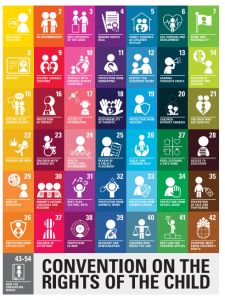
There are four articles in the Convention that are seen as special. They’re known as the “General Principles” and they help to interpret all the other articles and play a fundamental role in realising all the rights in the Convention for all children. They are:
1. Non-discrimination (Article 2)
2. Best interest of the child (Article 3)
3. Right to life survival and development (Article 6)
4. Right to be heard (Article 12)
The principles of articles are based on equality, dignity, respect, non- discrimination and participation.
· Rights are for ALL children – UNIVERSAL
· Rights are there at BIRTH – INHERENT
· Rights CANNOT be taken away – INALIENABLE
· Rights DO NOT have to be earnt – UNCONDITIONAL
· All rights are EQUALLY important – INDIVISIBLE
Children learn about their rights across the curriculum
· in the classroom (Article 28: the right to an education),
· at lunchtime (Article 24: the right to nutritious food and clean water),
· in the playground, (Article 31: the right to relax, play and take part in a wide range of cultural and artistic activities)
· in the local community (Article 2: child rights apply to every child without discrimination, whatever their ethnicity, gender, religion, language, abilities or any other status, whatever they think or say, whatever their family background.
· and as a global citizen (Article 4 (implementation of the Convention) Governments must do all they can to make sure every child can enjoy their rights by creating systems and passing laws that promote and protect children’s rights.)
The Rights Respecting School Award is divided into three sections:
Bronze – Rights Committed
Silver – Rights Aware
Gold – Rights Respecting
St Andrew’s School have been awarded the Bronze level and are working towards the silver level.
Any parent wishing to get involved with this initiative should contact Gina Drummond.
Charters
A charter is a visual document that establishes an agreed set of rights-based principles upon which relationships can be based and which provide a language for shared values. Creating charters can support a positive learning environment for children and young people in the classroom, across the whole school, in the playground or in specific areas within the school context.
Creating a charter helps to make the United Nations Convention on the Rights of the Child (CRC) more prominent and relevant. – UNICEF
At St Andrew’s School we establish our class charters at the start of the academic year to ensure that our classrooms are a place where children’s rights are respected. Adults (Duty-bearers) and Children (Rights-holders) make pledges to explain how they are going to use the UN Convention within school life. Charters are updated throughout the year to link in with topics, events and learning that is taking place.

Article of the Month
At St Andrew’s School, we have an Article of the Month to help us promote children’s rights across school.
The Article is on display in each classroom and around school. We also share it with our parents through Marvellous Me and our social media page. It is important that everyone in our school community knows about children’s rights so we try to tell as many people about our Article of the Month as possible!
Here is a sneak peak at some of the learning about rights which has been taking place across our school:
September 2022 – Article 28 – I have the right to an education.
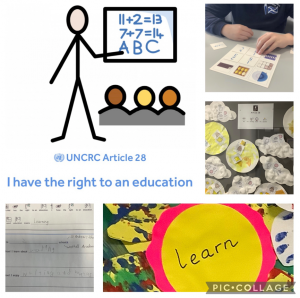
October 2022 – Article 12 – I have the right to be listened to and taken seriously.
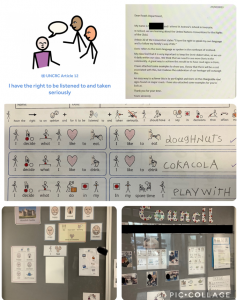
November 2022 – Article 13 – I have the right to find out and share information.
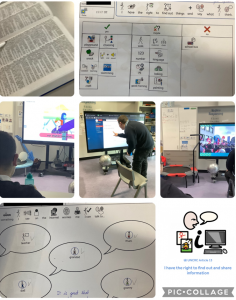
December 2022 – Article 2 – All children have these rights
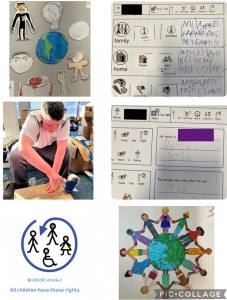
One of our pupils has been helping a local charity to ensure that refugee children from Ukraine are getting their rights. He has helped to pack clothes and toiletries.
January 2023 – Article 24 – I have the right to good quality health care, to clean water and good food
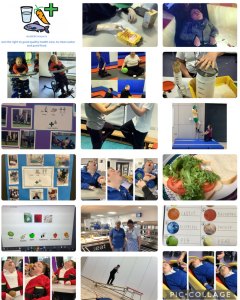
February 2023 – Article 40 – I have the right to get legal help and to be treated fairly if I have been accused of breaking the law
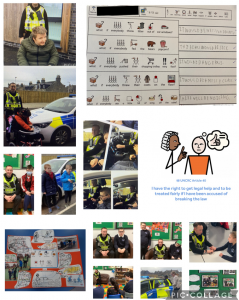
March 2023 – Article 29 – I have the right to an education which develops my personality, respect for others’ rights and the environment
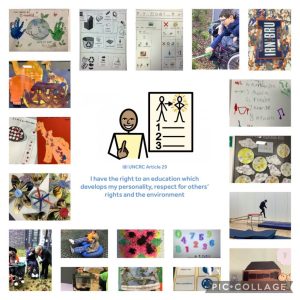
April 2023 – Article 23 – If I have a disability, I have the right to special care and education
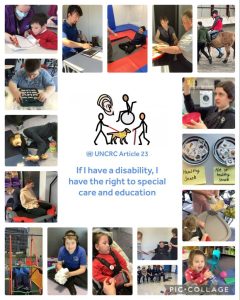
May 2023 – Article 3 – Adults must do what’s best for me
June 2023 – Article 31 – I have a right to relax and play

